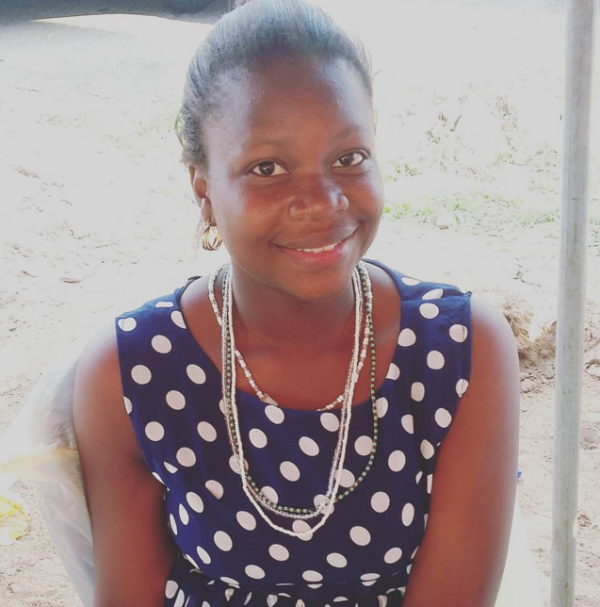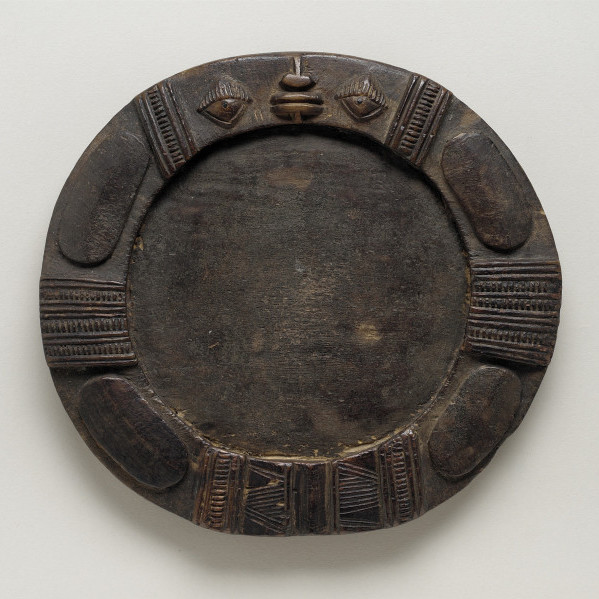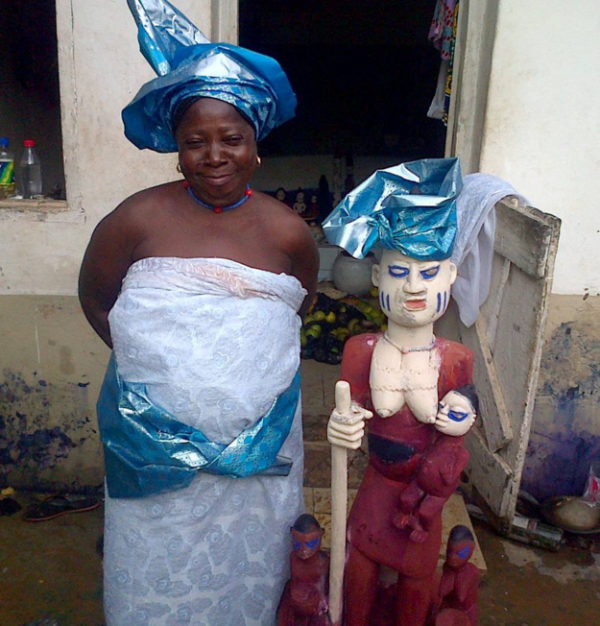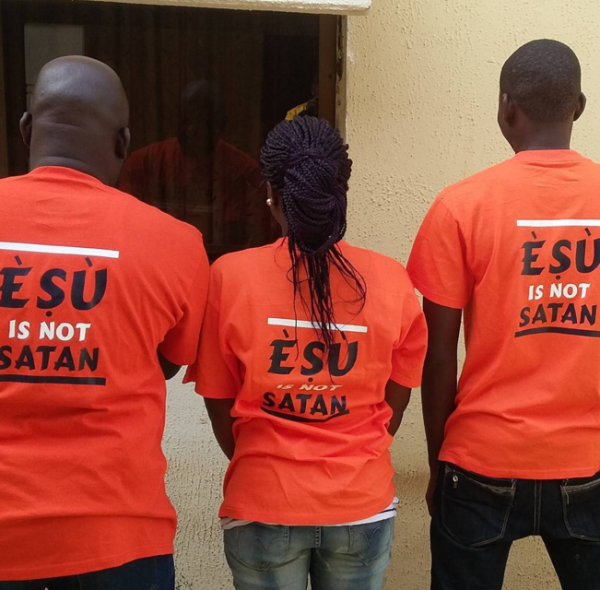PARTE DE UNA ENTREVISTA HECHA POR KOLA TUBOSUN DEL "BLOG LITERARIO AFRICANO" A UNA SACERDOTISA DE YEMOJA EN NIGERIA.
Al final de este escrito esta la entrevista original en Ingles
___________________________________
___________________________________
Iyalóriṣà Omítọ̀nàdé Ifáwẹ̀mímọ́ es una sacerdotisa de Yemọja y también graduada en Ciencias Económicas en la Universidad Obafemi Owolowo. Vive en Ibadan, Estado de Oyo, Nigeria.
IYALORISA OMITONADE - ...El culto de Òrìsà Culto es practicado por el Babalórìṣà o la Ìyálórìṣà. Los Orisa son considerados como ministros de Olódùmarè e intermediarios entre la humanidad y Olódùmarè. Los Orisa son seres humanos que vivieron en la tierra y que llevaron a cabo su vida de una manera ejemplar. Ellos fueron venerados más tarde como Òrisà después de su muerte ... gente como Sango, Oya, Osun, yemoja, etc. los devotos de Òrisà hacen uso de Ẹrìndílógún (dieciséis caracoles) para su adivinación.
KOLA - ¿Cómo decidió a cuál de las deidades adorar? O ha sido en particular una de su familia?
IYALORISA OMITONADE - Mi Orisa Guardián es yemoja. Los yorubas creen que todos nacemos con un destino específico que es un propósito en la vida. Y antes de que nuestra alma venga a la tierra hemos tomado la decisión de cual será nuestro destino y, al hacerlo, elegimos nuestro Odu de nacimiento de uno de los 256 del cuerpo de Ifá o del Eerindilogun (dieciséis caracoles), nuestro Orisa guardián y a los antepasados que nos guían en ese camino. A continuación, esa información se le facilitará al iniciado de tal manera que contribuya a orientar su camino en su Destino. Además, uno aprenderá la forma de encaminarse para que el destino pueda guiarlo a tener éxito, salud, familia, relaciones y la victoria en los tiempos difíciles. Junto con esto, uno tendrá a su disposición la identidad de aquellos alimentos o comportamientos que agotan su Ase (tabúes), y esto debe ser evitado. Mi trayectoria del Destino fue guiada por medio de la adivinación llamada Ẹrìndílógún (dieciséis caracoles). Se reveló mi Orisa Guardián, que es Yemoja, se hizo la iniciación y todo lo demás. Orisa me ha estado guiando en mi camino y mantengo los tabúes y debilidades que me dieron durante mi iniciación. A pesar de que en mi familia han estado adorando a Orisa antes de que yo naciera...
KOLA - Entonces, para gente como yo, del grupo étnico o nacido de hijos cuyos padres son yorubas, que nunca buscamos información sobre nuestro Odu de nacimiento, Guardián, Tutor, etc., hay alguna manera para saberlo? ¿Si es así, cómo? Sé que somos descendientes de seguidores y profesionales de Ogun, lo que se refleja en nuestro Oriki. Pero nada se ha mencionado acerca de un Odu de nacimiento.
IYALORISA OMITONADE - Sí, hay una manera para saberlo y es a través de la adivinación con Ifá o con Orisa. Usted puede ser un descendiente de Ogun, sin embargo, puede ser que no funcione con su propia cabeza / cabeza interior personal. Puede ser otro Orisa. ... Se puede llegar a conocer su Odu de nacimiento durante los procesos de iniciación o mientras se lleva a cabo la iniciación.
KOLA - ¿Cuánto tiempo le ha tomado para aprender el proceso del sacerdocio de Orisa y cuáles son los retos?
IYALORISA OMITONADE - Ya han pasado 20 años desde que he comenzado el proceso de aprendizaje del sacerdocio de Òrisà y todavía estoy aprendiendo. (...) Al ser un Sacerdote / Sacerdotisa hay que aprender procedimientos y ritos tradicionales (iniciaciones, aprendizaje de Ẹrìndílógún, etc )...
___________________________________
En la entrevista hay ciertas cosas que quedan claras:
1) Las personas pueden saber cuál es su Orisa tutelar acudiendo a un babalawo (opele o ikin) o a un sacerdote de Orisa (merindinlogun)
2) Se puede obtener el odu de nacimiento de un recién nacido o de cualquier persona que se inicie ("nazca") en el culto de Orisa a través de un babalawo (opele o ikin) o de un sacerdote de Orisa (merindinlogun)
3) Aunque una persona nazca dentro del linaje familiar de determinado Orisa, su cabeza puede ser de otro Orisa.
Omítọ̀nàdé Ifáwẹ̀mímọ́ is an Orisa priestess who is also a graduate of Economics from the Obafemi Awolowo University. She was a guest at the last Aké Arts and Books Festival where she participated in a panel about the plurality of the African religious space. I caught up with her with a few questions of my own.
Documento original en Ingles
***
Tell me about yourself, your educational background.
My name is Ẹgbẹ́ladé Omítọ̀nàdé Ifáwẹ̀mímọ́. I live in Ibadan, Oyo State, Nigeria. I practice African Traditional Religion. I am a Yemọja Priestess, also versed in Ifá. I am a graduate of Ọbáfẹ́mi Awólọ́wọ̀ University, Ilé-Ifẹ̀, Ọṣun State where I studied Economics Education.
Tell me about your interest and knowledge of Ifá and Oriṣà worship. How did it begin, and why?
What interests me in Ifá and Òrìṣà worship is that it can help our people to connect with their Guardian Orìṣà and the ancestors. And in doing so, help them to follow their destiny and to be the best person they can be.
Ifá and Òrìṣà worship are the original spiritual practices in Africa especially in Yorùbáland. In Yorùbáland where the religion comes from, the worship, rituals and traditions were mainly family-based. The practice of Ifá/Orìsà is a spiritual path to transformation, a transformation from the inside out, that begins with you as an individual and ends with you as an individual. Ifá worship is different from Òrìṣà worship.
Ifá worship is practiced by a Babaláwo or Ìyánífá. Ifá is the esoteric word of Olódùmarè. Ifá is the connector between mankind and Olódùmarè. Ọ̀rúnmìlà is the intermediary between Ifá and Olódùmarè. Ọ̀rúnmìlà is the Òrìṣà of wisdom, prophesy and ethnics. Babaláwo or Ìyánífá are believed to be able to contact Ọ̀rúnmìlà during their divination, rituals. They make use of Ọ̀pẹ̀lẹ̀ and Ikin Ifá as their means of divination. While Òrìsà Worship is being practiced by Babalórìṣà or Ìyálórìṣà. Òrìṣà are considered as ministers of Olódùmarè and intermediaries between humanity and Olódùmarè. Òrìṣà are human beings who once lived on earth and who performed in an exemplary way. They were later venerated as Òrìṣà after their death… people like Ṣàngó, Ọya, Ọ̀ṣun, Yemọja et al. Òrìṣà devotees make use of Ẹ̀rìndílógún (Sixteen Cowries) for their divination.
Ifa Orisa worship began from time immemorial. My take is that as mankind evolved and became aware of natural phenomena and the works of Olódùmarè around them, they found that all these things couldn’t have just come to being on their own, hence the need to reverence a Supreme Being (Olódùmarè). You know the Supreme Being provides its existence through nature like water, fire, wind… which represent each Òrìṣà. It is this belief that helped maintain our ecosystem.
Something I’ve always wondered about, what’s the difference between Ọbàtálá and Ọrúnmìlà?
Ọ̀rúnmìlà is different from Ọbàtálá in terms of their functions but they are both Òrìṣàs. Ọ̀rúnmìlà is also known as Ẹlẹ́rìí Ìpín (the witness of human destiny). It is believed that he knows everything about man and can give advice as to any events. Ọ̀rúnmìlà was charged with the function of using his profound wisdom, knowledge and understanding of divination to put the chaotic earth in order. He knows the past, present, future and this is why he is called Akéré f’inú ṣọgbọ́n (the small one with the mind full of wisdom). While Ọbàtálá also known as Òrìṣà Nlá, Osogiyan, Ọbalùfọ̀n, Olúfọ̀n..is the god of creativity, purity, albinism, hunchback, paralysis. He is the eldest Òrìṣà and is held responsible for the creation of earth and of human bodies…
How did you decide which of the deities you would worship? Or has one particularly been in your family?
My Guardian Òrìṣà is Yemọja. The Yorùbá believe that we are all born with a specific destiny that is a purpose in life. And before our soul came to the earth we have made the decision as to what our destiny was to be and in so doing, we choose our birth Odù (one of the Ifá Corpus or the Sixteen Cowries), Guardian Òrìṣà and Guardian Ancestors to help us guide our path of destiny. My Path of Destiny was guided by the means of divination called Ẹ̀rìndílógún (Sixteen Cowries). It revealed my Guardian Òrìṣà, which is Yemọja, did the initiation and all sorts. The Òrìṣà has been guiding me on my Path when I keep to the taboos and weaknesses I was given during the initiation. Although they have been worshipping the Òrìṣà in my family before I was born… Ká sọ pé mo báa nílé ni *blushing*smiles*
So, for people like me, ethnic/native Yorùbá children, whose parents never sought information about our birth Odù, Guardian ancestors, etc, is there a modern way to find it? If so, how? I know that we’re descended from Ogún worshippers and professionals, and it is reflected in our Oríkì. But nothing has been mentioned about a birth Odù.
Yes, there is a modern way to find it, which is through Ifa/Orisa divination. You might be a descendant of Ogun, yet it might not work with your own Personal head/Inner Head. It may be another Orisa. It can never be mentioned, you know the birth Odu is Spiritual… You can get to know your birth Odu during the initiation processes or while the initiation is being held.
How have you coped with being an African spiritual worshipper in a country where Islam and Christianity have taken over the public spaces?
It has not been an easy one, but I thank Olódùmarè and Orí that I have always been the best. lol. Our people have turned away from it because of ignorance also they lack self knowledge. But I do try my best to enlighten them in my own little knowledge that I have in African spirituality. So help me Olódùmarè.
There is something fascinating about the tolerance of specifically Yorùbá religious beliefs for plurality that has allowed them to live in peace with other religions, even though the other religions haven’t given them the same courtesy. What part of the religious worldview of the Yorùbá do you think is responsible for that kind of tolerance of plurality and dissent?
In my own view the Yoruba traditional religion preaches peace and harmony in all forms, in the absence of peace (alaafia), iwure (Prayer) tends to hang. This had in turn made Yoruba Traditional adherents to tolerate foreign beliefs. Before the introduction of other religions, Yorubas lived comfortably with each other, and it was never documented in any of the oral scripture of Yoruba religion that some are non believers….In addition, Ifa have talked about other religions in details..
What misconceptions about Òriṣà worship would you like to enlighten them about if you can?
There is a misconception in Èṣù being a Satan or He is a depiction of evil. Èṣù is not Satan!!! This is a grave misconception of who Èṣù is in the Yorùbá tradition. The Èṣù Láàlú we worship in Yorùbá tradition is totally different to Satan/Shaitan in their Bible or Quran. Èṣù is among 801 Irúnmọlẹ of Olódùmarè whose actions and purpose on earth falls within the jurisdiction of Olódùmarè. Our own Èṣù has never opposed the will of Olódùmarè. He’s the one who bore our wishes up to Olódùmarè. He stand for justice and equity. All his attributes of power, wisdom, knowledge and skills are all given to him by Olódùmarè for the purpose of his mission on earth. He does not have the power or gut to contest the position of Olódùmarè. So, there is no correlation of any form between Satan/Shaitan and Yorùbá’s Èṣù Láàlú.
How long has it taken you to learn the process of Ọrìṣà priesthood, and what are the challenges?
It has been 20 yrs now that I have been in the learning process of the Òrìṣà Priesthood, and I am still learning. You know Ifá is a body of knowledge that is wide. Being a Priest/Priestess has procedures and traditional rites (initiation, learning of Ẹ̀rìndílógún et al). There are also a lot which are best known to oneself or personal.
Yeah, and speaking of that, let me ask you something else I may have asked you before. How hard is the memorization of the Odù Ifá? Because the survival of the Ifá divination systems has been because of generations of elders passing the knowledge down through words. How good must one’s retention be to be a successful priest or priestess? Can one just write things down rather than just commit them to memory? What role can technology play?
Culture is dynamic and ways of life evolve. Memorization is the first step/key—like learning ABC. But with the invention of technology, this has really assisted the means of learning by literal documentation and even oral recitations that can be seen on YouTube and other links that promotes Ifa divination. Learning through elders, like you’ve said will lay the template on which other learning improvements and advancements will strive. Technology will play the role of catalyst.
Of all the Odù Ifá, which is your favorite and why?
Ọ̀sẹ́ Òtúrá is my favorite Odù Ifá. Because it speaks about women. It says if they are not given honor and respect then they can become angry and have the ability to destroy the world. The Odù Ifá teaches us not to use our eyes to undervalue a woman. *blushing* *smiles*
Do you have mentors in Yorùbá spirituality, and how has the journey been so far?
My father is the main driver of my knowledge in African spirituality. He has really dedicated all his time to feeding me. Also, I wine and dine with the elders like Bàbá Awo Abíọ́dún Agboọlá, Bàbá Solomon Ọ̀ṣundárà, Ìyálórìṣà Ayọ̀délé, Iya Logunede, etc to seek for knowledge in Òrìṣà worship. The Journey have been so so beautiful and fun.
How do you think the interest in African spirituality can be stimulated in the country, and most of the misconceptions reduced?
Firstly I think that most importantly practitioners of the faith have to be shining examples of exemplary character in any area of life they find themselves. This would raise questions and pique people’s interests.
Secondly, as the world is now a global village, the good gospel of the faith must be propagated via publicity, public enlightenment… Example like the walk/movement for Èṣù we did last year December…
Finally question from me: a friend of mine, a devout Christian, wants me to ask you if your belief allows you to date or marry people who do not share your mode of worship.
Of course Yes. My religion accepts all humanity, no discrimination.







No comments:
Post a Comment